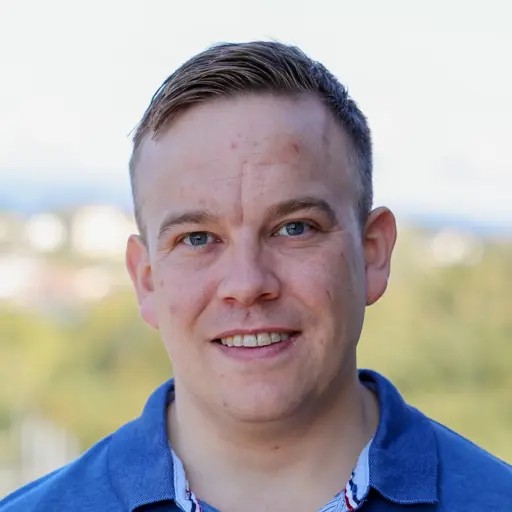The list of the projects receiving the European Research Council’s prestigious ERC Starting Grant is now official. Three Chalmers researchers are among the recipients: Alexander Giovannitti, Margaret Holme and Nils Johan Engelsen.

The grants from the European Research Council, ERC, are awarded projects tackling major challenges across all scientific disciplines. ERC Starting Grants are aimed specifically for researchers with two to seven years of experience since completion of PhD and who have a scientific track showing great potential and who have an excellent research proposal.
Here, the researchers present their projects:
Alexander Giovannitti
Assistant Professor at the Department of Chemistry and Chemical Engineering, receives 1,5 million euro for the project PolyElectroCAT.
The chemical industry is the largest industrial energy consumer. So far, this industry lacks sustainable, low-carbon intensive tools to produce chemicals and materials for our everyday lives. Driving chemical reactions with electricity instead of heating or applying pressure is a promising route to lower energy consumption and limit the emission of greenhouse gases since energy generated from renewables can directly be used to form products with high atom economies. However, efficient, precious element-free electrode materials are currently missing to develop the technology at scale. PolyElectroCAT will close this material gap by developing efficient electrode materials for electrochemical synthesis without relying on rare-earth elements.
“The ERC Starting grant will enable my group to start exploring this research direction where we will apply our expertise in polymer chemistry and electrochemistry to develop tailor-made polymeric electrode materials for electrosynthesis. I will be able to build a multidisciplinary and diverse research team to identify the chemical structures that lead to highly efficient electrodes. I am excited to get the project started”, says Alexander Giovannitti.
With the funding from the European Research Council (ERC), this project will develop tailor-made electrode materials based on redox-active polymers solely containing earth-abundant elements. These electrode materials are specially designed to bind reactants to increase the selectivity during electron transfer reactions. These multifunctional polymeric electrocatalysts are solution processible and function without additives and binder, enabling the fabrication of electrodes at low cost. The project will demonstrate the power of molecular design to unlock high-performance electrode materials without relying on precious elements to overcome bottlenecks for developing the technology at scale.
Margaret Holme
Assistant Professor at the Department of Life Scienes, receives 2,5 million euro for the project "Atlas of Organisation of Lipids in Extracellular Vesicles to Navigate Their Roles in Cancer Metastasis"
It is estimated that up to 90 percent of cancer deaths are caused not by the primary cancer but after it has metastasised, i.e., spread to other organs in the body. Communication and transfer of material between cells is a fundamental process in cell biology, for which nature uses extracellular vesicles (EVs). These nanometre-sized lipid-based vesicles are excreted by cells and play an important role in communication between tumours and distant organs where metastases can take hold.
However, exactly how this happens is still not well understood. While the roles of the extracellular vesicle proteins, nucleic acids and surface markers are increasingly well characterized, we still lack knowledge about the role of extracellular vesicle lipid composition.
"In this project we will create an atlas which documents the lipid composition of extracellular vesicles produced by cells from a variety of cancers. To do this we will merge insights from cell biology and membrane biophysics, using techniques including super-resolution microscopy and neutron scattering," says Margaret Holme.
"The results we gather will help to shed light on how differences in the lipid composition of extracellular vesicles can lead to differences in how effectively different types of cancer cells can metastasise. As well as contributing to our understanding of the fundamental processes of cancer metastasis, the knowledge gained will contribute to the development of new cancer therapeutics and diagnostic tools."
"This grant offers us a huge opportunity to explore the links between lipid composition of cancer cell-derived extracellular vesicles, and cancer progression. We will also develop methodology to study extracellular vesicles and their membrane organisation at neutron scattering facilities including the new ESS, which will open in Lund in the coming years."
Nils Johan Engelsen
Assistant Professor in Quantum Technology at the Department of Microtechnology and Nanoscience, receives 2,5 million euro for the project ”Sensing and Quantum Engineering with Magnetically Functionalized Ultracoherent Mechanical Resonators (SEQUENCE).”
Since quantum mechanics was first conceived, physicists have wondered whether macroscopic objects can be put into quantum superposition states, that is, to make an object be in "two places at the same time" in a quantum mechanical way. Preparing massive systems, objects consisting of more than one atom, in quantum states probes the limits of quantum mechanics and the interplay between quantum physics and gravity.
"During my postdoc, I developed mechanical resonators that are excellent sensors for forces and candidates for exploring quantum physics with massive objects. The main goal of my ERC project is to prepare truly quantum states of mechanical motion by coupling mechanical resonators to single atoms. By using the control over the atom's quantum state and transferring it to the mechanical resonator, which consists of billions of atoms, mechanical motion can be put into a quantum state," says Nils Johan Engelsen.
"The platform we will realize that couples light, mechanical motion and single atoms may also find use for quantum computing. On a more practical level, the system developed in the project will also be an excellent force sensor that can be used for nanoscale magnetic resonance imaging (MRI), where complex molecules, such as proteins, can be mapped atom by atom. This can give us insight into how proteins work with all the implications it may have for health and science."
Read more
Contact
- Assistant Professor*, Applied Chemistry, Chemistry and Chemical Engineering
- Assistant Professor*, Chemical Biology, Life Sciences
- Assistant Professor*, Quantum Technology, Microtechnology and Nanoscience


